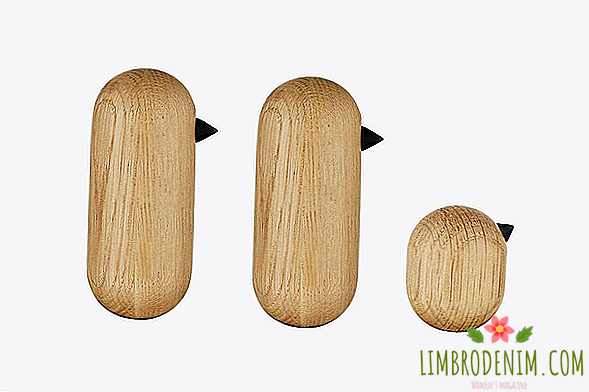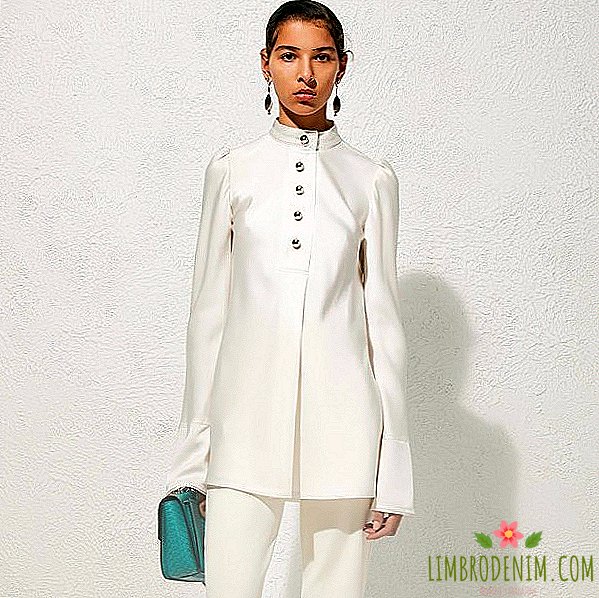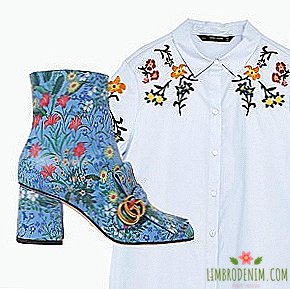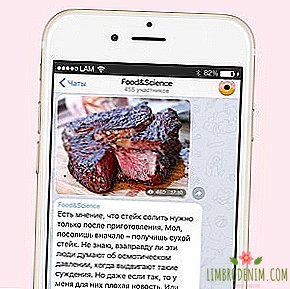Rainbow families: LGBT couples on how they raise children
While in Russia, the family is represented exclusively heterosexual, the reality is much more diverse: a child can grow with one parent, with two mothers or two dads - and in other, very different variations. True, in the Russian realities, homosexual families are forced to remain in an illegal situation: special care must be taken, and gay couples, in principle, have little chance of becoming fathers (the right to have a child using assisted reproductive technologies alone is only for women, and prohibited for single men by law, in practice, may result in additional difficulties). We talked to LGBT parents, both Russian and foreign, and learned how they raise children.
Interview: Elizaveta Lyubavina

Jose
Son, 5 years old, twin daughters, 4 years
 I always wanted to have children, and eventually my husband Tim came to this. We turned to a surrogate mother - this is how Avery’s son appeared. Tim was the father of the boy genetically, and he was very inspired by the experience of fatherhood. When the baby was only two months old, my husband came up to me and asked: "Do you know what I think?" - after which he naturally offered to have another child. I gladly met this idea, but when the surrogate mother was already pregnant, Tim passed away.
I always wanted to have children, and eventually my husband Tim came to this. We turned to a surrogate mother - this is how Avery’s son appeared. Tim was the father of the boy genetically, and he was very inspired by the experience of fatherhood. When the baby was only two months old, my husband came up to me and asked: "Do you know what I think?" - after which he naturally offered to have another child. I gladly met this idea, but when the surrogate mother was already pregnant, Tim passed away.
After Tim's death, I thought about abortion, but changed the decision. Many years ago I lost both parents, Avery had already lost his father. I thought that if something happened to me, the son would be left all alone. A financial question arose in front of me, but I decided that, since my rather poor parents had managed, I would be able to. Although we planned one child, the doctors explained that it is safer to transfer two fertilized eggs to the surrogate uterus so that the chances of a successful outcome are higher. Although twins were unlikely, I had amazing twins - genetically they are my daughters.
I was lucky - I did not have to go through a hard and dramatic coming out, but I still live in New York, a unique city in its openness. Unfortunately, in the US there are many places where such openness would be impossible. Here, in the same quarter where I live, there are eight or nine more gay fathers. I keep instagram, where I constantly use the hashtag #gaydad or #gayfather to increase visibility. My children are growing up in an inclusive environment. Just once a son asked me what it means to be "gay" - he wanted to find out if he could have a mother. I replied that this is impossible, because "gay is when two men love each other."
When I thought about new relationships, it seemed to me that no one would want to meet with me, because I have three children. It turned out the opposite: it turns out that a single mother is in a less comfortable position than a gay with children. Many gay people really want children, but the ways to become a father - whether adoption or the services of a surrogate mother - cost a lot of money. So they are more likely happy to find a partner who already has children. For half a year I have been meeting a cool guy: he came from Argentina, where gays cannot have children. He has an eighteen-year-old daughter born in a heterosexual marriage - he followed the “norms” for a long time and could not be himself, but eventually divorced and moved to New York.
Dasha
Son, 2.5 years
 To bring a child, we came in a year of relationships. We stopped on artificial insemination and started thinking about which donor to choose - an anonymous or not. We decided that the child should know his father better - so our friend from the LGBT community became the father of Akim.
To bring a child, we came in a year of relationships. We stopped on artificial insemination and started thinking about which donor to choose - an anonymous or not. We decided that the child should know his father better - so our friend from the LGBT community became the father of Akim.
We have not concluded any formal contracts, we are bound only by verbal agreements, the principle of which is simple - we are always looking for a compromise and act at the request of both parties. Vary and I welcomed the father’s participation in the child’s life, although he was not obligated to anything. Now he is playing the role of the “guest dad,” and Varya and I are primarily concerned with upbringing. As soon as the boy spoke, his father began to visit us much more often: apparently, he liked the word “daddy”. We have not decided on the names of all family members: for us it’s more important not how our son calls us, but how he feels.
My mother is madly in love with her grandson, even if she does not fully accept our family. Mom Vari occasionally comes with gifts, but no more. For a long time, the father of the child did not dare to tell his parents about the son, as well as about the orientation. He made a confession quite recently, his mother was delighted with her grandson and calmly accepted the coming-out.
I came to the conclusion that openness at the first contact with a stranger is impossible: first, he needs to make sure that I am the same person, and after that I can talk about our family. We do not shout about the orientation at every corner, but we honestly answer direct questions. For a long time, Varya and I worked together, but did not advertise the relationship. We were the only women in the team. I was afraid that my colleagues would be homophobic, but when they found out about my pregnancy and relationships, they calmly accepted it. Maximum allowed a few clumsy jokes: "Will Varya be mom or dad?" or "write the child as Akim Varyevich?".
Often, people around are well aware that Varya and I are family, but they do not comment on this in any way. It is unlikely that our relationship is a secret for kindergarteners, but there was no reaction. There was also an unpleasant situation when a colleague of my friend said that she categorically did not want to see children from same-sex families in her son’s class. But I think that she could change her mind if we knew each other personally. I think the main thing is to instill confidence in the child: if he is convinced that everything is in order with his family, he will be able to respond to the offender and will not worry about the gossip.
Ira
Daughter, 4.5 years
 The girl and I really wanted children. We decided to find a father among friends: we wanted the child to know him. First of all, we sought safety: in our country, the father, even if he does not live with the child, can serve as a good defense. In addition, I welcome his participation in the life of his daughter, although, of course, we did not insist on anything.
The girl and I really wanted children. We decided to find a father among friends: we wanted the child to know him. First of all, we sought safety: in our country, the father, even if he does not live with the child, can serve as a good defense. In addition, I welcome his participation in the life of his daughter, although, of course, we did not insist on anything.
First of all, I was looking for stability, it was important that a person impressed me. Father was Pasha, a young man of my friend - he wanted a child and was ready to participate in his life. The only condition that I put it then: the child will be recorded on me as a "single mother", but if necessary, Pasha will always be able to prove fatherhood. He did not mind. He is a responsible dad who never refused my request.
Together with the children, we celebrate holidays, we go to visit each other, we carry our daughter to her grandmother, Pasha's mother. Although we had problems with the family structure: at first I wanted the child to have one father and one mother - for me this is a purely safety issue. Polina, at that moment my girlfriend, on the contrary, is not afraid of public opinion; She insisted that my daughter call her mother and her. We decided to baptize the girl so that Polina received the “official status” of her mother, albeit a godmother. In kindergarten, they periodically ask me who, besides me, takes the child, and the godmother or aunt is a very plausible version.
I try not to advertise the romantic life - unlike Polina, this is not close to me. I am open to a circle of friends where I am accepted. At the same time, I don’t hide anything from my daughter: I told her about gays and lesbians, I just didn’t name the concepts themselves, so that she would not accidentally use them with outsiders.
After the break with her partner, the security issue is not so acute: Polina continues to be engaged in raising her daughter, but we no longer live together. I do not exclude the possibility of emigration, I thought about Germany - it is not easy to leave, but in a critical situation this may be necessary.

Pasha
Daughter, 4.5 years
 I wanted to become a father, so when the girls turned to me, I immediately agreed. In the LGBT community there are no random children: their appearance is always discussed and pronounced. Of course, all our agreements are informal: verbally, we came to the conclusion that we have equal rights to communicate with the child, but my participation remains voluntary. I really wanted to see my daughter - Ira and Polina took upon themselves the bulk of her upbringing, and we and her boyfriend are participating in her life as “weekend daddies”. In addition, we have two grandmothers and grandfathers: my mother and the parents of the young man were very happy to have a granddaughter, now they help us and communicate with both mothers, Irina and Polina.
I wanted to become a father, so when the girls turned to me, I immediately agreed. In the LGBT community there are no random children: their appearance is always discussed and pronounced. Of course, all our agreements are informal: verbally, we came to the conclusion that we have equal rights to communicate with the child, but my participation remains voluntary. I really wanted to see my daughter - Ira and Polina took upon themselves the bulk of her upbringing, and we and her boyfriend are participating in her life as “weekend daddies”. In addition, we have two grandmothers and grandfathers: my mother and the parents of the young man were very happy to have a granddaughter, now they help us and communicate with both mothers, Irina and Polina.
Of course, the first question you ask your friends whose children have already grown up is the school question. According to their experience, I can say that there is almost no problem - only if some of the children in the class have very intolerant parents who will start making a fuss. If the child is still faced with conflicts, the main thing is not to let the situation go by itself, to explain to him that he is loved, and families are different. Despite state homophobia, the Internet is full of useful information on the topic. You can also count on the help of a competent psychotherapist - at least in large cities.
Spencer
Two sons, 3 and 2 years old
 I always wanted to have children, but for a long time I thought it was impossible, because I am gay. Surrogate mother services are not available to everyone: in America, their cost starts at fifty-two thousand dollars. The process of adoption through the agency also turned out to be too expensive for us. When in Utah legalized same-sex marriage (in 2014. - Note ed.), we got equal rights with heteropairs and were able to take the children into custody under the state program, and after two years - adopt them.
I always wanted to have children, but for a long time I thought it was impossible, because I am gay. Surrogate mother services are not available to everyone: in America, their cost starts at fifty-two thousand dollars. The process of adoption through the agency also turned out to be too expensive for us. When in Utah legalized same-sex marriage (in 2014. - Note ed.), we got equal rights with heteropairs and were able to take the children into custody under the state program, and after two years - adopt them.
Salt Lake City is a very religious community: in Utah, Mormons were pioneers for whom religion is the basis of identity. Cunning-out was hard for me: my parents were upset and angry that I "chose to be gay." Surprisingly, of course: at least one person wants to become gay in the environment where we live, especially in Russia? It took my parents a few years to accept me. They had long and actively opposed the legalization of same-sex marriages, but then they got used to the fact that Dustin and I were together - probably because we knew him well. Although they are unlikely to ever fight for LGBT rights, we still feel their support and love. Dustin's story is similar to mine, it took his parents time.
Gay father is a rare and unusual phenomenon for Utah. At the same time, it is very important for us to be as “normal” as possible and give our boys the same childhood as others. While the guys are small, they do not have to interact with social institutions, but in the future we are waiting for the school, and probably it will be public. We do not want to hide only because someone deems us "wrong." We hope that everything will be in order.
Probably, when the guys realize that their family is different, we will have a difficult conversation. We want the boys not to go through an identity crisis, and for that they need to know that their family was like that from the very beginning. My husband and I are a recognizable gay couple. Fame brought us a video where I make a proposal to Dustin: we recorded it for friends, but they offered to put it on YouTube. We quickly realized that we didn’t like fame at all, but decided to use it to raise the visibility of the LGBT community, and started an instagram. I realized that I was gay, in my early childhood - I was eight years old - but then there were no social networks where I could find examples to follow. Many teenagers in Utah are now fighting for the right to be gay, and I want them to know that they are not alone.
Nadine
Two sons, 11 years and 4.5 years, daughter, 1 year
 My first child appeared in a partnership: first my girlfriend gave birth, and a year later - me. We both chose artificial insemination with anonymous donors: we didn’t want the children to have a connection with the father. I had already got two more children not in a pair: I again made artificial insemination and turned to the same donor so that the children were brothers and sisters.
My first child appeared in a partnership: first my girlfriend gave birth, and a year later - me. We both chose artificial insemination with anonymous donors: we didn’t want the children to have a connection with the father. I had already got two more children not in a pair: I again made artificial insemination and turned to the same donor so that the children were brothers and sisters.
As a couple, we built a family model with two mothers: we were confident that our relationship should be completely open. So we existed not only for children, but also for the outside world, for example, in a state clinic. We saw how the puzzled expression on the face gradually gives way to “Ok, I won’t ask too many questions.” It was even convenient for doctors: while one mother listens to the doctor, another deals with the child.
We broke up with the girl, after the gap, each remained with her biological child. Despite the difficulties, we managed to maintain family relationships - children are not to blame for anything, and it is unacceptable to separate them because of our differences. One time, to avoid conflicts, we just silently came to each other to pick up or bring children. After the break, our family policy has changed, and we decided to abandon the concept of two mothers - so the child does not need to constantly get used to the new "mothers", that is, our partners. Now we see the former girl far less often, she emigrated to Germany.
I believe that it is necessary to talk about this with a child in stages and focus on the current level of perception. While the son did not ask direct questions, if this happens - I will answer. It seems to me that children see everything, but rather support their guesses with questions. He clearly perceived my partnership as family life, he simply had no conceptual apparatus to describe it. And it is easy to explain - the law on “propaganda” does not allow to touch the topic of LGBT with children. But whatever our legislation, it is not written anywhere that homosexual children can be teased, much less mocked. We have the right to stop the harassment, asking for help from teachers and the school administration. We can not allow the child to hide problems or afraid to tell others about the mother.

Olya
Daughters, 10 and 11 years old
 My children appeared in a heterosexual marriage, I was in it for seven years. I adopted the older one, and the younger one - under guardianship. The father now participates in the lives of girls and comes several times a week. I did not talk to children about my relationship: it seems to me that it’s too early to raise this topic. Of course, we discussed that I no longer live with my dad, but I did not explain this by the fact that I began dating women. At this age, children usually do not understand what you can say openly and what not. For girls, my girlfriend is my mother's friend.
My children appeared in a heterosexual marriage, I was in it for seven years. I adopted the older one, and the younger one - under guardianship. The father now participates in the lives of girls and comes several times a week. I did not talk to children about my relationship: it seems to me that it’s too early to raise this topic. Of course, we discussed that I no longer live with my dad, but I did not explain this by the fact that I began dating women. At this age, children usually do not understand what you can say openly and what not. For girls, my girlfriend is my mother's friend.
My partner does not fulfill the role of second parent: we are in a relationship not so long ago and are in no hurry to move in. However, I have no expectations: all I really want is a good attitude towards my children. I am ready to accept the children of my partner as my own, but I do not expect this in return.
Issues related to children can be regulated by a notarized power of attorney: it does not give equal rights to the parent, but allows you to travel with the child or take him to the doctor. In general, for LGBT people, all family relationships are kept on an honest word: if one of the partners after parting wants to stop communicating and take the child with them, the second will not be able to influence it. All responsibility actually falls on the mother recorded in the documents.
Now family holidays are connected with restrictions for me, I cannot invite my girlfriend. This is very offensive for both of us, but I do not want to deprive the children of relatives, because the society does not accept us. In the same way, I can’t come to the girl’s parents: as soon as she tries to tell about her relationship, they pretend they don’t hear.
Of course, I can always present my partner to others as a second cousin or girlfriend: close communication and even the cohabitation of two women still attract less attention than similar stories in men. But it would be unfair to both of us. Now I try not to advertise the relationship, while one of the daughters is under guardianship, I don’t want to risk it - the guardianship is strictly controlled.
I talked to the children about the adoption, but asked not to advertise it at school. I think when the question of the family arises, I will do the same. At the same time, I want to talk openly with them, for example, to explain what social norms are: they change, and if now our family does not fit into them, this does not mean that it will always be like this.
Vika
Daughter, 7 years old, waiting for another child
 I did not plan to give birth on my own, so I stopped on adoption. From the experience of friends I realized that it was not a big deal. I adopted Julia when she was six months old. Marina became a part of our family later, when our daughter was three years old. Now we are waiting for another child: in two weeks we will have a son. Marina became a biological mother. We stopped on artificial insemination with an anonymous donor. We chose a commercial maternity hospital so that I could attend the birth.
I did not plan to give birth on my own, so I stopped on adoption. From the experience of friends I realized that it was not a big deal. I adopted Julia when she was six months old. Marina became a part of our family later, when our daughter was three years old. Now we are waiting for another child: in two weeks we will have a son. Marina became a biological mother. We stopped on artificial insemination with an anonymous donor. We chose a commercial maternity hospital so that I could attend the birth.
We did not encounter any particular difficulties due to our orientation, probably due to our caution. We do not visit the state polyclinic and take the child to the doctors by LCA - they will not ask too many questions about the family. At the same time, the daughter attended the state garden: from time to time Marina took the girl, but the caregivers did not ask for anything - they are already happy that the child was taken at all. Colleagues and distant relatives do not know anything about us. I am the official representative of the child. Sometimes Marina meets Julia after school, but this is not surprising: anyone can do this - a nanny, grandmother, aunt or friend. When Marina traveled with Julia, we made out a power of attorney.
Julia has already asked how she was born. Я отвечала, что другая женщина её родила, а потом отдала в специальный домик, где детки ждут родителей - там я её увидела и сразу захотела забрать к себе. Когда Юля спрашивает об отце или о родах, я объясняю, как появляются дети - рассказываю о сперматозоиде и яйцеклетке. К счастью, среди наших знакомых разные семьи, на их примере я показываю дочке разнообразие.Once, Yulia met her family, where one of her parents made a transgender transition. Children do not have patterns of perception, as in adults. So far, Julia did not ask what kind of relationship we have with Marina, but, apparently, she perceives my girlfriend as part of the family.
The Rainbow Families program of the LGBT group “Coming Out” helps us a lot: we exchange experiences and support each other. She works in St. Petersburg, but programs for LGBT families exist in other cities. All families, both homo and heterosexual, have the same difficulty. First of all, we deal with issues of development, education and health. The issue of orientation fades into the background. It seems to me important to develop in the child the flexibility of thinking, to teach not to take anything on faith, not to divide the world into black and white.
Photo: Indish (1, 2, 3)




